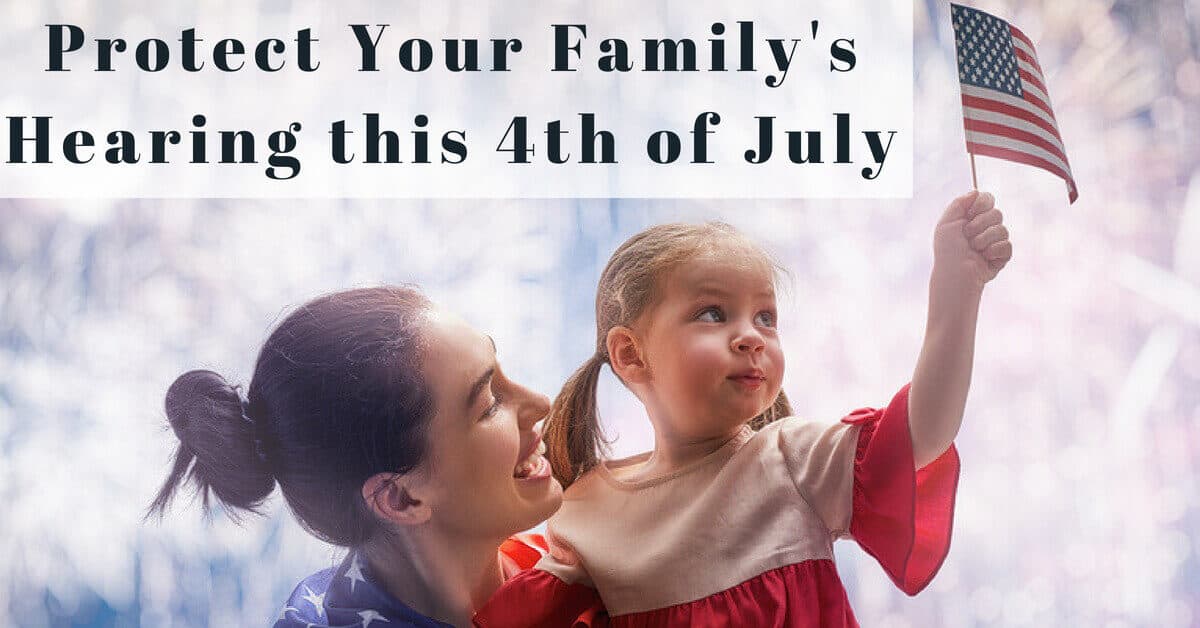We love the 4th of July, parades, barbeques, family picnics, pool parties – and then there’s the fireworks. At My Hearing Centers we want you to enjoy the 4th, but we also want you to be aware it is the noisiest holiday and the one most likely to cause hearing loss. Fireworks are often as loud as gunfire or the loudest rock concert!
American Speech Language Hearing Association President Elizabeth McCrea cautions people to be careful during fireworks events. She said, “the 4th is a wonderful opportunity for revelry, but we must ensure that our hearing health does not fall prey to our desire to celebrate.”
Here’s some suggestions to enjoy the 4th and preserve your hearing!
The facts
Noise from exploding fireworks can reach as high as 155 decibels. So, if we ranked that with other sounds, a jackhammer is 130 decibels, a jet plane on take off is 120 and a chainsaw is 100 decibels. Sounds louder than 85 decibels can cause permanent hearing loss. Although hearing loss is often thought to be progressive over time it can also be caused by a loud, instantaneous noise – like some of the newer flash-bang fireworks that are being used as ground effects alone with aerial fireworks. The bigger the firework “boom” the less time it takes to cause damage. Long or repeated exposure to sounds at or above 85 decibels – like the sound of a snowblower or bulldozer – can cause hearing loss.
Safety tips
Keep your distance – The closer you are to the source of the noise, the greater the risk for immediate, sudden and permanent hearing loss. Stay at least 50 to 65 feet away from fireworks, firecrackers, speaker systems broadcasting the fireworks noise and other sources of loud sound. That would be a little bit father away than the average length of a school bus.
Kids should be 165 to 200 feet away – that would be about half the length of a football field. Remember the auditory systems of children and teen are not fully developed and they are more susceptible to harm from loud noise.
Children under the age of 12 months should not be exposed to fireworks. If your child puts their hands over their ears – its too loud for them and it is causing distress to the auditory system. Babies and children cry at the fireworks because of the noise, not the light.
Use protection
Fireworks are a visual experience, wearing ear plugs or ear muffs means you can enjoy the spectacle, ooohhh and ahhh to your heart’s content and prevent hearing loss. Ear plugs should fit snuggly and they are available almost anywhere these days. Roll them between your fingers before inserting so they expand in the ear canal. They don’t block the sound entirely, but they do give you protection from loud sounds. You still get the experience, but you are protected from overpowering sounds. They are an easy and inexpensive way to protect your hearing during loud events.
Bring out the ear muffs for protection. No, not the fuzzy ones people use in the winter time – the ones you use at the indoor monster truck rallies, at the racetrack or on the riding lawn mower. They have soft, padded ear cuffs and slim head bands. The ear cuffs help make sure you are still getting air circulation around your ears even though they are being covered to protect them from loud noise. There are even foldable ones for easy storage and carrying. They also come in fashion colors to appeal to small kids and big kids!
Know your limits
A good rule of thumb is to avoid noise that is “too loud” “too long” or “too close.” If you notice a ringing or buzzing in your ears, move away from noise source. There are environmental conditions that can make sounds louder even if you move away, so be aware of your surroundings. Fireworks can sound louder if the reverb off buildings. Weather conditions play a factor, too. High humidity helps sound waves travel farther.
Seek professional help
If you think you or your child is experiencing issues because of loud fireworks, get a hearing evaluation at My Hearing Centers. If ringing or buzzing in your ears persists after the fireworks or if tinnitus is an issue, see a professional. Hearing damage and loss due to loud instantaneous sounds can affect all ages.


